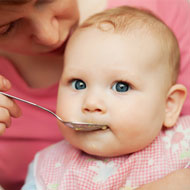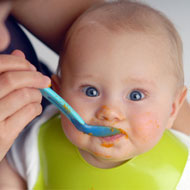- General Articles
- General Pregnancy Questions
- Baby Growth
- Pregnancy Diet
- Miscarriage
- During Pregnancy
- Twin Pregnancy
- Toddler Meals
- Home Remedies During Pregnancy
- Breastfeeding
- Pregnancy Week By Week
- Pregnancy Tests
- Ectopic Pregnancy
- Pregnancy Signs and Symptoms
- Pregnancy Stages
- Potty Training
- Fetal Development
- Preschooler
- Postpartum Depression
- Toddler Illness
- Baby Care
- After Pregnancy
- Molar Pregnancy
- During Delivery
- Beauty and Style
- Pregnancy Clothing
- Preconception
- Fertility
5 Best Cereals for Babies
The American Academy of Pediatrics recommends introducing cereals that have been fortified with iron and mixed with breast milk or formula into a baby's diet from about six months onwards. Cereals offer a convenience unmatched by other foods and are extremely nutritious. Nowadays, cereals for babies come fortified with iron and different vitamins and minerals that are essential for a growing baby.
Choosing between the numerous cereals available can be quite a challenging task. Let us consider some of the parameters that you as a parent need to consider while making your choice.
Pediatricians usually recommend feeding your baby a ready-to-eat cereal that contains at least one gram of protein and six milligrams of iron in each serving.
Protein is an essential nutrient required to fuel the rapid growth that infants undergo. Iron is an essential mineral, the lack of which may lead to cognitive defects in a child. The cereal you choose should also have adequate amounts of dietary fiber and should be low in sugar content. A cereal that has no artificial flavoring agents or preservatives is also preferable. Consult your baby's pediatrician about your baby's dietary requirements and a suitable cereal.
No one disputes that cereal is the best choice of food for your baby's health. The main advantage of cereals lies in the fact that they do not need cooking, making their use extremely convenient for working mothers. Commercial baby cereal is made from processed grain that has been milled into flour, then precooked and subsequently dehydrated.
Studies indicate that babies and children who eat cereal tend to have diets that are healthier and more nutritious when compared to those kids who skip breakfast or do not eat cereal. They also tend to be less prone to being overweight.
Here is a list of the five best types of cereals to feed your baby.
- Rice based infant cereals - These are generally considered to be the tastiest option for children as well as being hypoallergenic. Rice being a bland grain is a lot more easily accepted by infants because they can still taste and smell the breast milk or formula that they have been used to. Of all the rice based cereals available, choose one that has been made from brown rice as its higher fiber content will be beneficial to the baby's digestive system. Remember to choose one that has been fortified with iron and essential vitamins and minerals.
- Oatmeal based infant cereals - Another favorite with the pediatricians are oatmeal based cereals. These have high fiber content and are highly nutritious and most children enjoy their taste. Many oatmeal based cereals come with added fruits such as bananas or strawberries. It is better to first introduce plain oatmeal into your baby's diet before trying the fruit based ones. This will make it easier for you to identify the culprit in case your baby has an allergic reaction.
- Wheat based infant cereals - These cereals have stirred up a debate over their potential for causing allergic reactions, but so far research has been unable to establish a link between early wheat exposure and the development of food allergies later in life. Choose a cereal that is made from whole wheat grain for its high dietary fiber content. Consult your pediatrician about the appropriate time for introducing this type of cereal into your baby's diet.
- Barley based infant cereals - Although relatively uncommon, barley based cereals may be used in case your child has developed an allergy to other types of cereals. Barley blends well with milk and fruit and is usually well accepted by children. Barley is a good source of dietary fiber as well.
- Mixed infant cereals - These cereals should only be introduced after your baby has eaten and can tolerate each of the individual grain cereals independently. The advantage of mixed grain cereals lies in the added flavor as well as their nutritional variety. They come mixed with a variety of additional ingredients such as dried fruits that enhance their flavor. Once again, you should ask your pediatrician about the best time to introduce these cereals into your baby's diet.
Read more articles from the Toddler Meals Category.



 7 Must-Haves Before Your Baby Arrives
7 Must-Haves Before Your Baby Arrives Bonding Games for Babies
Bonding Games for Babies DIY Baby Bath Towel Apron
DIY Baby Bath Towel Apron Common Late Pregnancy Fears
Common Late Pregnancy Fears